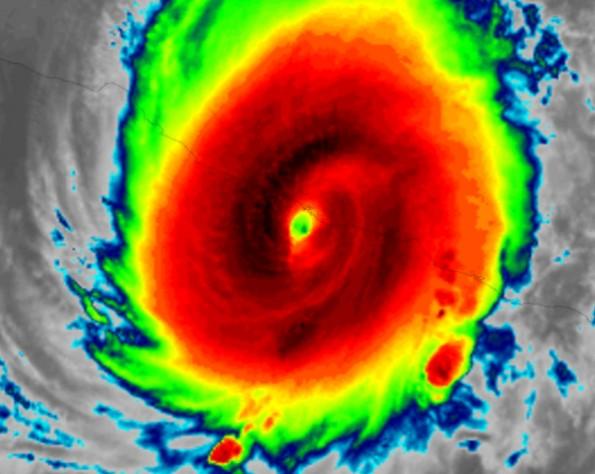WMO Hurricane Committee retires the names Otis and Dora from the eastern North Pacific basin name list
The World Meteorological Organization (WMO) Hurricane Committee has retired Otis from the rotating list of names used in the eastern North Pacific basin because of the death and destruction it caused when it made landfall in the Mexican resort city of Acapulco in October 2023.

The Committee also retired Dora from the eastern North Pacific name list, not because of direct damage, but because of sensitivities to the name Dora and the indirect meteorological role it played in the devastating wildfires in Maui, Hawaii, in August 2023. The name Dora was also retired from the Atlantic basin name list in 1964.
Otilio and Debora instead will be used in the lists of names, which are overseen by WMO to help in the communication of storm warnings and to alert people about potentially life-threatening risks. The names are repeated every six years, unless a storm is so deadly that its name is retired.
The Committee did not retire any Atlantic basin names – the first time this has happened since 2014.
The naming convention – whilst attracting the most public attention – is only a small part of the life-saving work of the Hurricane Committee.
"The work of the Hurricane Committee is critical to ensuring that everyone in the region across the Atlantic and east Pacific basins is ready for the upcoming 2024 hurricane season, and reducing the impacts to life and property from these dangerous storms," said Dr Michael Brennan, Chair of the Hurricane Committee and Director of the Regional Meteorological Specialized Center Miami.

The meeting in Panama is also due to focus on operational priorities including the provision of forecasts and warnings for wind, rainfall, storm surge and flooding hazards, as well as impact assessments. This year the Committee will include two special sessions; the Panel on ocean observations and services; and Early Warning Systems for All.
“The Hurricane Committee embodies the spirit of cooperation and service delivery that is so essential to WMO as we rise to the greatest challenge of our era: the climate crisis,” said WMO Secretary-General Celeste Saulo in a video address to the meeting.
“We all know that 2023 was the hottest year on record. The development of El Niño in the Pacific Ocean played a role. But we also observed unprecedented levels of ocean warming in the North and tropical Atlantic. This is continuing in 2024,” she said.
The record-warm ocean temperatures in the Atlantic helped fuel an above-average hurricane season in 2023 and provided a strong counterbalance to the traditional El Niño impacts (which tends to reduce the number of hurricanes).
Active 2023 season
The Atlantic basin saw 20 named storms in 2023 and the eastern Pacific basin had 17 named storms.
The strongest storm of the season was Hurricane Otis, which made landfall near Acapulco, Mexico, on Oct. 25 as a category-5 hurricane (on the Saffir-Simpson Hurricane Wind Scale), with sustained winds of 260 km per hour (160 mph). Otis holds the record as the strongest landfalling hurricane in the eastern Pacific after undergoing rapid intensification in which wind speeds increased by 115 mph in 24 hours.
Fifty-one people died in Acapulco, in addition to thirty-four missing people. Otis caused economic losses of about US$ 3.2 billion (53 198 million Mexican pesos), according to Mexican authorities.
Dora was a long-lived hurricane that reached category 4 intensity while it traversed portions of the eastern and central Pacific basins. Dora crossed the International Dateline, becoming a typhoon, before it weakened and reached the western portion of the Pacific.
The hurricane passed south of the Hawaiian Islands on 8 August and reached the International Dateline on 12 August, becoming a rare tropical cyclone to have travelled acrossall three of the tropical cyclone basins of the Pacific Ocean and only the second to do so as a hurricane (the previous was Hurricane John in 1994).
There were no reports of damage or casualties directly caused by Dora. However, Dora was indirectly linked to the catastrophic wildfires in Maui, Hawaii. There were some indications that Dora’s passage to the south enhanced the low-level trade winds which fanned the deadly flames across the Hawaiian Islands.

Early Warnings for All
The Hurricane Committee consists of experts from National Meteorological and Hydrological Services and represents North America, Central America and the Caribbean (WMO Regional Association IV) and related countries such as Cabo Verde. Portugal and Spain participated at the meeting as observers.
The main outcomes of the Committee’s session will be brought to the upcoming 4th International Conference on Small Island Developing States (SIDS4) in Antigua and Barbuda in May 2024.
The Atlantic hurricane season officially lasts from 1 June to 30 November, while the eastern North Pacific hurricane season runs from 15 May through 30 November.
Every year, there are on average 85 named tropical cyclones all over the world. Over the past 50 years they have caused a daily average 43 deaths and US$ 78 million losses and have also been responsible for one third of both deaths and economic losses from weather-, climate- and water-related disasters, according to WMO statistics from 1970-2019. But the death toll has fallen dramatically thanks to improvements in forecasting, warning and disaster risk reduction coordinated by WMO’s Tropical Cyclone Programme.
United Nations Secretary-General Antonio Guterres has tasked WMO with drawing up a plan to ensure that everyone in the world is covered by early warning systems in the next five years.
The work of WMO’s Hurricane Committee is a central plank of Early Warnings for All.
欲了解更多信息,请联系:
- Clare Nullis WMO media officer cnullis@wmo.int +41 79 709 13 97
- WMO Strategic Communication Office Media Contact media@wmo.int

